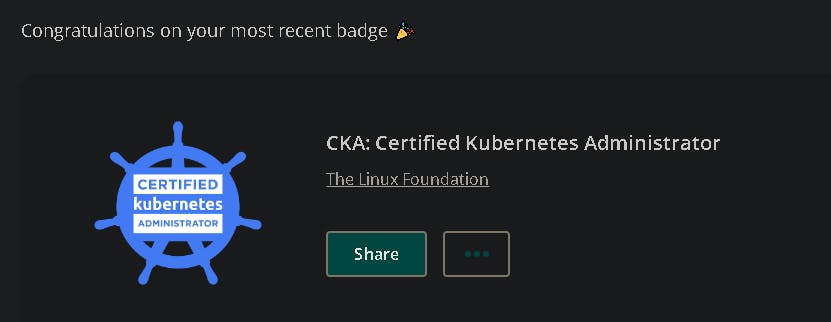How I Passed the Certified Kubernetes Administrator (CKA) Exam in 3 Months: Tips and Strategies

Photo by Mila Young on Unsplash
Achieving the Certified Kubernetes Administrator (CKA) certification within a span of three months might seem like a daunting task, but with the right resources and strategies, it's definitely feasible. In this blog, I'll share my journey and the techniques I used to pass the CKA exam on my first attempt.
Exam preparation:
Leveraging KodeKloud Courses and Practice Labs: One of the first steps I took was signing up for KodeKloud and immersing myself in their Kubernetes courses and practice labs. I went through various courses such as "Kubernetes for Beginners," "Certified Kubernetes Administrator," and "Certified Kubernetes Application Developer." These courses not only provided me with theoretical knowledge but also hands-on experience through practice labs.
Additionally, I ensured to familiarize myself with bash and vim commands, as proficiency in these tools is essential for efficient navigation and editing within a Kubernetes environment.
Familiarity with kubectl commands, understanding jsonpath can be extermenly useful. Refer to 'Kubectl quick reference guide' here: https://kubernetes.io/docs/reference/kubectl/quick-reference/
Preparation Before the Exam:
Prior to the exam, thorough preparation is crucial. I made it a point to go through all the labs available in KodeKloud's CKA course, ensuring that I was comfortable with various tasks and scenarios that might be encountered during the exam.
To simulate exam conditions and gauge my readiness, I extensively utilized KodeKloud's Ultimate CKAD Mock Exam Series. This helped me identify areas where I needed further improvement and build confidence in tackling exam-like questions.
Furthermore, I focused on commonly asked topics such as upgrading kubeadm clusters, backup and restoration of etcd, creating ingress, deployments, pods, persistent volume claims (PVCs), persistent volumes (PVs), roles, and role bindings. Watch YouTube videos about this topic to get up-to-date answers.
For additional practice, I explored resources like killer.sh mock exams (included in the exam bundle) and k8simulator.com. While the latter had some inaccuracies in configurations, it still provided valuable practice opportunities.
Tips for the Exam
During the exam, time management and efficiency are paramount. Here are some tips that proved beneficial for me:
Utilize templates from the Kubernetes documentation instead of crafting YAML files from scratch. This significantly reduces time spent on repetitive tasks.
Employ the
--dry-run=client -o yamloption to generate templates directly from the command line, saving time on YAML file creation.Use
--helpwith commands such askubectl get pods --helpto explore available options and examples, aiding in command syntax and usage.If stuck on a particular question, don't hesitate to skip it and return later. Time management is critical, and getting stuck on one question shouldn't jeopardize the entire exam.
Familiarize yourself with the exam requirements beforehand and ensure your exam environment is properly set up to avoid any last-minute issues.
In case of technical difficulties, such as those encountered with the PSI environment, troubleshoot by temporarily disabling firewalls or antivirus software and running the application as an administrator/root.
After the exam, I received the results in about 24 hours. The anticipation after exam is not so fun. I was relived to see that the intense preparations paid off :)

Passing the CKA exam within three months of preparation is achievable with dedication, the right resources, and effective strategies. By leveraging platforms like KodeKloud, practicing extensively, and implementing time-saving techniques, you can increase your chances of success on the first attempt. Remember to stay calm, manage your time wisely, and trust in your preparation. Good luck on your journey to becoming a Certified Kubernetes Administrator!
